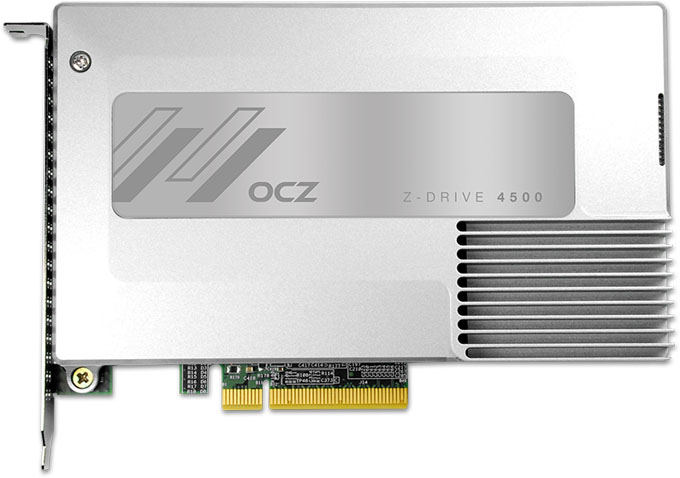- Qualcomm Launches Snapdragon 4 Gen 2 Mobile Platform
- AMD Launches Ryzen PRO 7000 Series Mobile & Desktop Platform
- Intel Launches Sleek Single-Slot Arc Pro A60 Workstation Graphics Card
- NVIDIA Announces Latest Ada Lovelace Additions: GeForce RTX 4060 Ti & RTX 4060
- Maxon Redshift With AMD Radeon GPU Rendering Support Now Available
OCZ Updates Z-Drive: Introducing the Z-Drive 4500 PCIe
OCZ is well-known for its long history with unique and often exotic PCIe-based solid-state drive solutions, and as its new announcement of a brand-new Z-Drive model is its first since being acquired by Toshiba, it should make it interesting to watch.
The Z-Drive 4500 is the successor to the venerable Z-Drive R4, so much of it will sound familiar. The 4500 Series uses the same Virtualized Controller Architecture (VCA) to combine eight onboard SandForce SF-2582 SSDs into one PCIe 2.0 x8 card. The card packs 19nm Toshiba MLC flash memory into a half-length, one-slot thick form-factor with a fullbody aluminum heatsink covering the underside of the card. Temperature sensors and thermal throttling are now integrated into the card.

The 4500 will ship with an integrated “Windows Accelerator (WXL)” software package for flash management, and to provide a caching solution with Windows Server. This software gives the option for either part or all of the Z-Drive 4500 to be used as a caching drive.
VCA is more advanced than simply a form of RAID; instead the individual drives support configurable redundancy for as much failsafe as is needed. VCA 2.0 also offerings TRIM and SCSI Unmap Support, and all VCA data remains stored in nonvolatile memory in case of power failure.
The Z-Drive 4500 PCie will be offered in 800GB, 1.6TB, and 3.2TB capacities , with sequential read performance topping out at 2,900MB/s and 2,200MB/s for writes. Random performance is 252.000 / 78,000 IOPS read/writes respectively. Unfortunately for enthusiasts, these are enterprise class drives, meaning the 800GB model starts at $2,355, with the 3.2TB fetching $6,533. Endurance-wise the 800GB model is rated for 680TB of writes, although that sounds like a conservative rating given the five-year warranty these drives will ship with (as compared to the Z-Drive R4’s three years).



